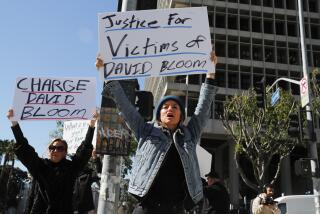Jury Again Convicts Man in ’82 Slaying
- Share via
For the second time in two decades, a jury Wednesday found Robert Bloom Jr. guilty of the 1982 murder of his father.
With the finding of first-degree murder, Bloom, 36, faces a maximum sentence of 27 years to life in prison. Bloom is also accused of the first-degree murders of his stepmother and stepsister during an April 22, 1982, rampage, and the jury will continue deliberations on those charges today.
If Bloom is convicted of at least one more murder and is found sane, he could face the death penalty.
Prosecutors contend that Bloom, who was 18 at the time, killed his father, Robert Bloom Sr., because the man had abused him emotionally and physically.
The Sun Valley teenager then shot his stepmother, Josephine Lou Bloom, and his 8-year-old stepsister, Sandra Hughes, because they were witnesses to the crime, said Deputy Dist. Atty. Shellie Samuels.
A Bloom attorney, Deputy Alternate Public Defender Seymour Applebaum, argued that Bloom killed his father in an argument and should be found guilty of voluntary manslaughter.
In his closing argument last week, Applebaum said Bloom was “fully dissociated” when he later shot his stepmother and stepsister, and therefore should be convicted of involuntary manslaughter for their deaths.
Applebaum also argued that Bloom is “profoundly mentally ill.”
Regardless of the jury’s decision on the other two murder charges, Bloom will have a hearing to determine whether he was sane at the time of the crime. If he is found to have been sane and if he is convicted of at least one other murder, then the jury will make a decision on the death penalty.
The original Van Nuys jury found him guilty of three counts of first-degree murder. After he fired his lawyer and represented himself during the penalty phase, Bloom asked for the death penalty, and the jury complied.
But in 1997, the U.S. 9th Circuit Court of Appeals overturned his conviction and sentence because of ineffective assistance of counsel, saying his lawyer had mounted an inadequate psychiatric defense.
More to Read
Sign up for Essential California
The most important California stories and recommendations in your inbox every morning.
You may occasionally receive promotional content from the Los Angeles Times.












